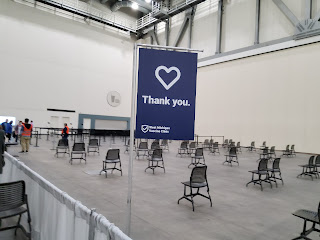You know how you can use the Kelly Blue Book to look up the price of a car? You input the make, model, condition, etc, and it tells you more or less what a fair price for the car is?
Imagine having something like that for medical expenses. Hospital stays are notoriously ruinous without insurance, and sometimes even with it. The thing about insurance is that they keep staff onhand to dispute markups on services. So the insurance company (and by extension, you) aren't stuck paying a thousand percent markup on over-the-counter painkillers.
The Problem
Why is it like this? It's actually not as simple as hospitals being greedy. It's because the US healthcare system has, overall, shifted away from the metaphorical ounce of prevention in favor of the metaphorical pound of cure. Hospitals, you see, can't refuse to treat someone based on whether they can pay. But because healthcare is so expensive, a lot of people don't go to the doctor or dentist immediately when they have a problem.
Instead, they postpone dealing with the issue until it goes away or turns into an emergency. Naturally, this is when it's most expensive to treat, and narrows your options considerably, but if you can't afford even the basic prevention (because your insurance sucks, or you don't have any at all), it doesn't really matter to you. So the hospital treats the unfortunate person, but the person can't pay. The hospital is still out that money, so what are they to do? Pestering the person via debt collection agencies isn't a very successful option, plus it takes time.
The solution, as it happens, is to jack up all their prices on everything. By making people who can pay, pay more, they can systemically balance their budgets after a fashion.
As you can hopefully see, this is a crappy solution. And it's vastly unfair to people without insurance companies to negotiate on their behalf, or even with an insurance company that half-asses their negotiations. It's also typical that people will go into getting medical procedures with absolutely no idea how much it'll cost them, then getting slapped with the bill later.
The Immediate Solution
For both of these issues, there's a solution, and it's called Fair Health. While the website has its own tutorials and informative videos, I'll briefly explain how some of the site works.
You can look up how much a procedure or treatment will cost you. The site will ask you where you are, because that matters in the calculations. It may also ask you whether you're in-network or out-of-network, which is insurance-ese for asking whether you're getting the service from a doctor they approve of, in a place they approve of.
Finally, they'll ask for something significantly harder to provide: a CPT code or precise description of the service. I know about CPT codes because I did a bit of work with them at the front desk of an ABA clinic, but I don't think most people are familiar, so:
In brief, a CPT code is a precise designation for a medical treatment or procedure.
For example, I looked up D2392, which is "a plain white resin-composite filling that covers two surfaces on a back tooth." You've got the material type (resin composite), the procedure type (filling), the location (a back tooth, like a molar), and the approximate amount of effort involved (two surfaces, meaning the top and side of the tooth could be involved, which means a moderate amount of material, molding, and drilling is likely to be involved).
You can look these CPT codes up online, but in all honesty, you're better off just getting the exact CPT codes from the doctor's office when these procedures are proposed. If you've got a smartphone, you could even look up the codes while you're in there with the doctor.
The site also has informative sections about insurance, including explanations of common insurance-ese terms like "in network" and "out-of-network." It's fairly basic information, and I don't feel like it's super-well organized, but it is good information to know. Having it somewhere free and publically accessible is definitely preferable to not having it.
There's one odd caveat with this site, and it's that it doesn't cover government insurances. Medicare, Medicaid, and Tricare data is not included here. The site pretty much exists to help uninsured people, and people on private insurance, make sure they aren't scammed or overcharged.
In the Long Term
You may have noticed this website doesn't solve the systemic problem of hospitals jacking up their prices to compensate for treating people who need the help but can't pay. It can help by educating individual consumers, but the overall problem persists. Y'know what would solve that overall problem?
Universal healthcare. Whether that's Medicare for All or some other version, returning to the "ounce of prevention is better than a pound of cure" model of healthcare would save us all a fortune. People would be able to get cavities filled without feeling like they've chosen their health over being able to pay rent that month.
In an age of unprecedented bad physical and mental health, where the average lifespan (for everyone, not just autistic people) is actually decreasing for the first time in decades, I feel like we could use the change.
By the way, if you ever want to do a good deed and personally take a metaphorical bite out of the suffering this unfair healthcare system creates, RIP Medical Debt is an excellent way to do so. They buy up uncollected medical debt from debt collection agencies and forgive it. It's an unusual method, but it lets them take $100 in donations and use it, on average, to forgive $10,000 of debt. Be sure to check it out!















